1
If you follow the will of God, you know that in spite of all the terrible things that happen to you, you will never lose a final refuge. You know that the foundation of the world is love, so that even when no human being can or will help you, you may go on, trusting in the One that loves you.Pope Benedict XVI
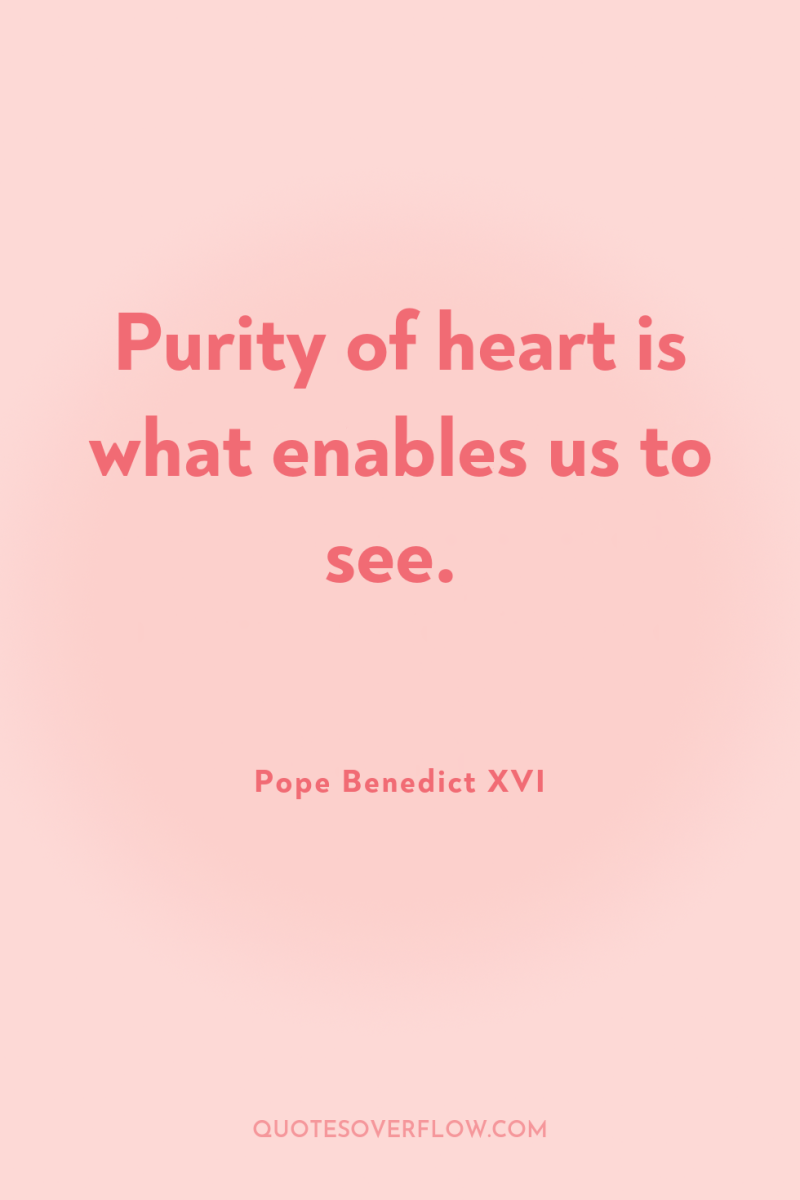
2
Purity of heart is what enables us to see.Pope Benedict XVI
3
In the course of my intellectual life I experienced very acutely the problem of whether it isn't actually presumptuous to say that we can know the truth - in the face of all our limitations. I also asked myself to what extent it might not be better to suppress this category. In pursuing this question, however, I was able to observe and also to grasp that relinquishing truth doesn't solve anything but, on the contrary, leads to the tyranny of caprice. In that case, the only thing that can remain is really what we decide on and can replace at will. Man is degraded if he can't know truth, if everything, in the final analysis, is just the product of an individual or collective decision. In this way it became clear to me how important it is that we don't lose the concept of truth, in spite of the menaces and perils that it doubtless carries with it. It has to remain as a central category. As a demand on us that doesn't give us rights but requires, on the contrary, our humility and our obedience and can lead us to the common path.Pope Benedict XVI

4
The human person finds his perfection "in seeking and loving what is true and good.Pope Benedict XVI
5
The great question that will be with us throughout this entire book: What did Jesus actually bring, if not world peace, universal prosperity, and a better world? What has he brought? The answer is very simple: God.. He has brought God, and now we know his face, now we can call upon him. Now we know the path that we human beings have to take in this world. Jesus has brought God and with God the truth about our origin and destiny: faith, hope and love. It is only because of our hardness of heart that we think this is too little. Yes indeed, God's power works quietly in this world, but it is the true and the lasting power. Again and again, God's cause seems to be in its death throes. Yet over and over again it proves to be the thing that truly endures and saves.Pope Benedict XVI
6
Knowing is not simply a material act, since the object that is known always conceals something beyond the empirical datum. All our knowledge, even the most simple, is always a minor miracle, since it can never be fully explained by the material instruments that we apply to it. In every truth there is something more than we would have expected, in the love that we receive there is always an element that surprises us.Pope Benedict XVI
7
The capacity to accept suffering for the sake of goodness, truth and justice is an essential criterion of humanity, because if my own well-being and safety are ultimately more important than truth and justice, then the power of the stronger prevails, then violence and untruth reigns supreme.Pope Benedict XVI
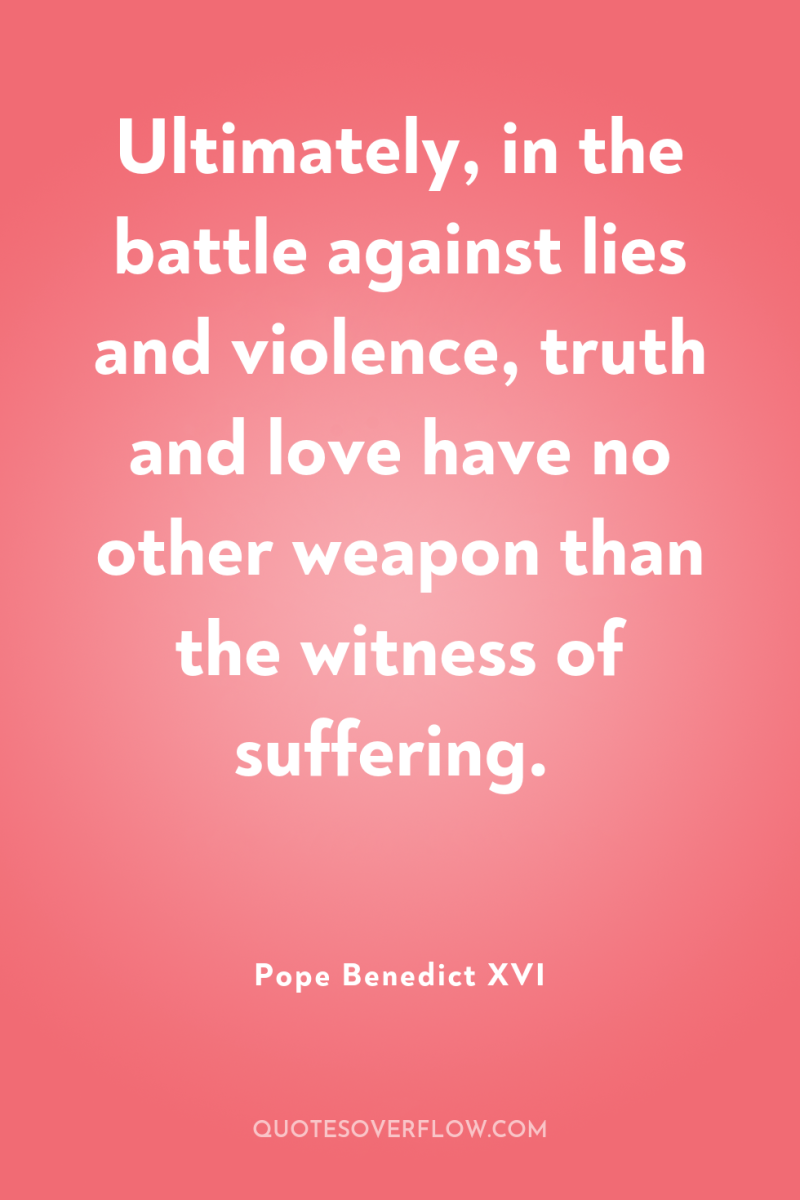
8
Ultimately, in the battle against lies and violence, truth and love have no other weapon than the witness of suffering.Pope Benedict XVI
9
It is obvious that the concept of truth has become suspect. Of course it is correct that is has been much abused. Intolerance and cruelty have occurred in the name of truth. To that extent people are afraid when someone says, "This is the truth", or even "I have the truth". We never have it, at best is has us. No one will dispute that one must be careful and cautious in claiming the truth. But simply to dismiss it as unattainable is really destructive.(..) We must have the courage to dare to say: Yes, man must seek the truth; he is capable of truth. It goes without saying that truth requires criteria for verification and falsification. It must always be accompanied by tolerance, also. But then truth also points out to us those constant values which have made mankind great. That is why the humility to recognize the truth and to accept it as a standard has to be relearned and practiced again. The truth comes to rule, not through violence, but rather through its own power; this is the central theme of John's Gospel: When brought before Pilate, Jesus professes that he himself is The Truth and the witness to the truth. He does not defend the truth with legions but rather makes it visible through his Passion and thereby also implements it. .Pope Benedict XVI
10
Today we have to learn all over again that love for the sinner and love for the person who has been harmed are correctly balanced if I punish the sinner in the form that is possible and appropriate. In this respect there was in the past a change of mentality, in which the law and the need for punishment were obscured. Ultimately this also narrowed the concept of law, which in fact is not only just being nice or courteous, but is found in the truth. And another component of the truth is that I must punish the one who has sinned against real love.Pope Benedict XVI
11
If in my life I fail completely to heed others, solely out of a desire to be 'devout' and to perform my 'religious duties', then my relationship with God will also grow arid. It becomes merely 'proper', but loveless.Pope Benedict XVI
12
The glory of God is the living man, but the life of man is the vision of God', says St. Irenaeus, getting to the heart of what happens when man meets God on the mountain in the wilderness. Ultimately, it is the very life of man, man himself as living righteously, that is the true worship of God, but life only becomes real life when it receives its form from looking toward God.Pope Benedict XVI
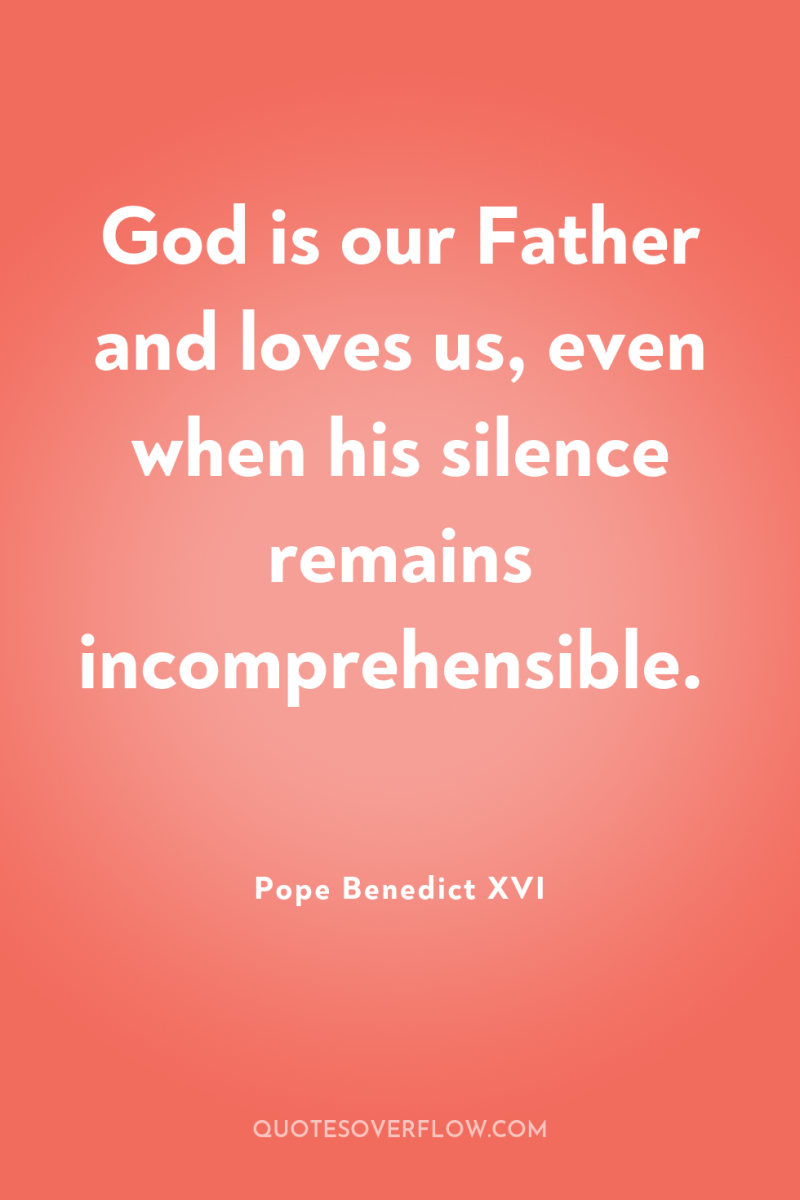
13
God is our Father and loves us, even when his silence remains incomprehensible.Pope Benedict XVI
14
Without God man neither knows which way to go, nor even understands who he is.. One of the deepest forms of poverty a person can experience is isolation.. Poverty is often produced by a rejection of God's love, by man's basic and tragic tendency to close in on himself, thinking himself to be self-sufficient or merely an insignificant and ephemeral fact, a "stranger" in a random universe.. The human being develops when. . his soul comes to know itself and the truths that God has implanted deep within, when he enters into dialogue with himself and his Creator.. It is not by isolation that man establishes his worth, but by placing himself in relation with others and with God.Pope Benedict XVI
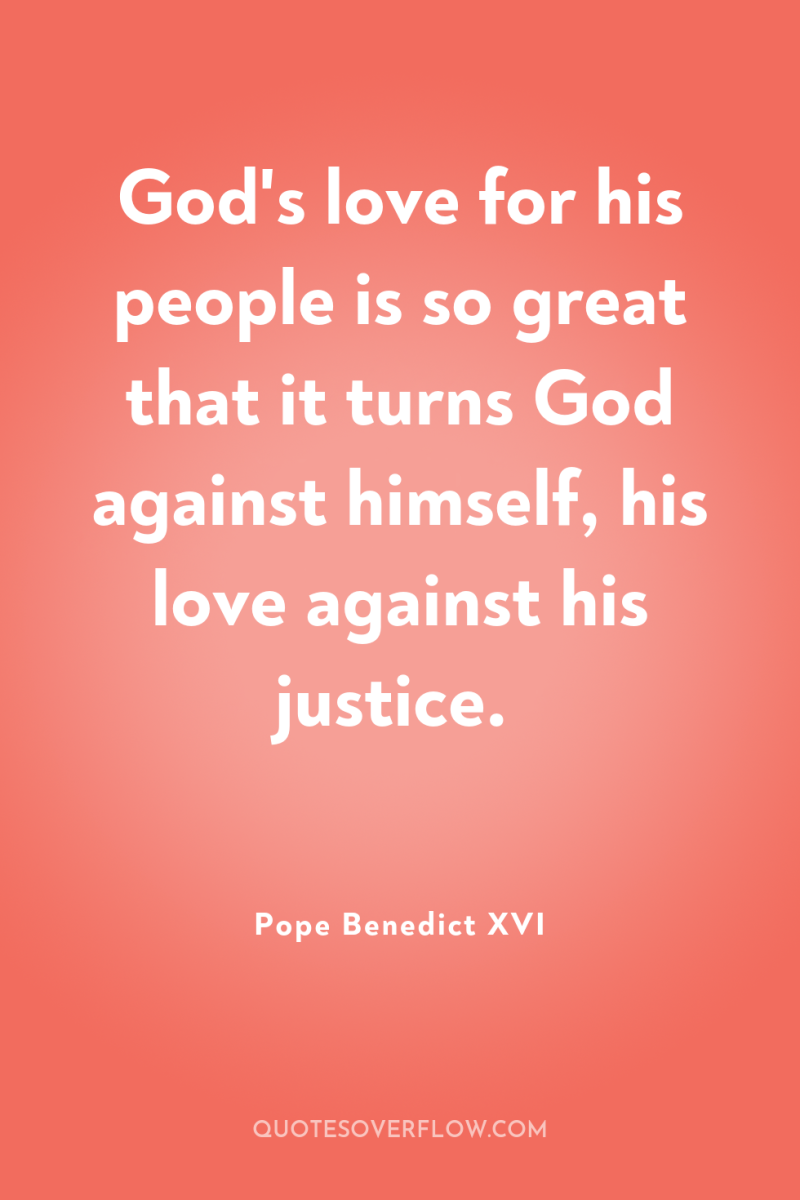
15
God's love for his people is so great that it turns God against himself, his love against his justice.Pope Benedict XVI

16
The 'commandment' of love is only possible because it is more than a requirement. Love can be 'commanded' because it has first been given.Pope Benedict XVI
17
Beauty, then, is not mere decoration, but rather an essential element of the liturgical action, since it is an attribute of God himself and his revelation. These considerations should make us realize the care which is needed, if the liturgical action is to reflect its innate splendour.Pope Benedict XVI
18
To have Christian hope means to know about evil and yet to go to meet the future with confidence. The core of faith rests upon accepting being loved by God, and therefore to believe is to say Yes, not only to him, but to creation, to creatures, above all, to men, to try to see the image of God in each person and thereby to become a lover. That's not easy, but the basic Yes, the conviction that God has created men, that he stands behind them, that they aren't simply negative, gives love a reference point that enables it to ground hope on the basis of faith.Pope Benedict XVI
19
Faith, hope and charity go together. Hope is practised through the virtue of patience, which continues to do good even in the face of apparent failure, and through the virtue of humility, which accepts God's mystery and trusts him even at times of darkness. Faith tells us that God has given his Son for our sakes and gives us the victorious certainty that it is really true: God is love! It thus transforms our impatience and our doubts into the sure hope that God holds the world in his hands and that, as the dramatic imagery of the end of the Book of Revelation points out, in spite of all darkness he ultimately triumphs in glory. Faith, which sees the love of God revealed in the pierced heart of Jesus on the Cross, gives rise to love. Love is the light–and in the end, the only light–that can always illuminate a world grown dim and give us the courage needed to keep living and working. Love is possible, and we are able to practise it because we are created in the image of God. To experience love and in this way to cause the light of God to enter into the world–this is the invitation I would like to extend with the present Encyclical. .Pope Benedict XVI
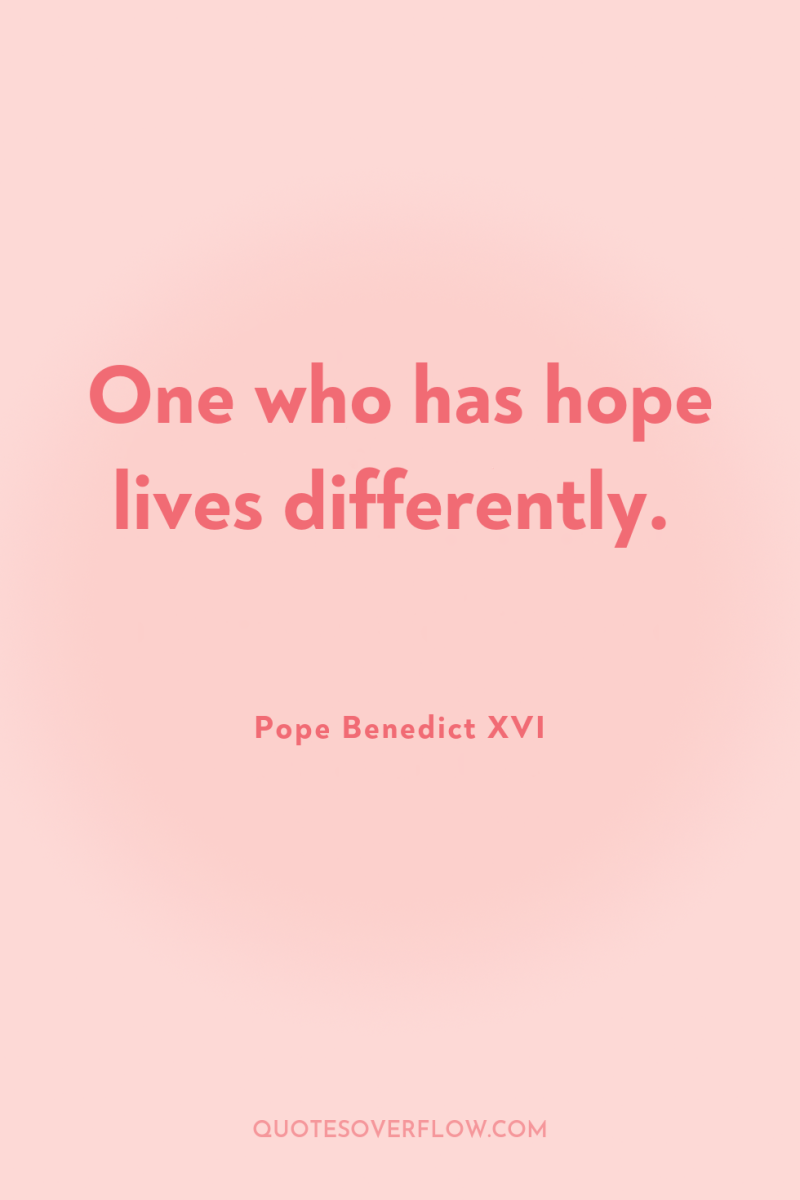
20
One who has hope lives differently.Pope Benedict XVI
21
The aim of all Christian education, moreover, is to train the believer in an adult faith that can make him a "new creation", capable of bearing witness in his surroundings to the Christian hope that inspires him.Pope Benedict XVI
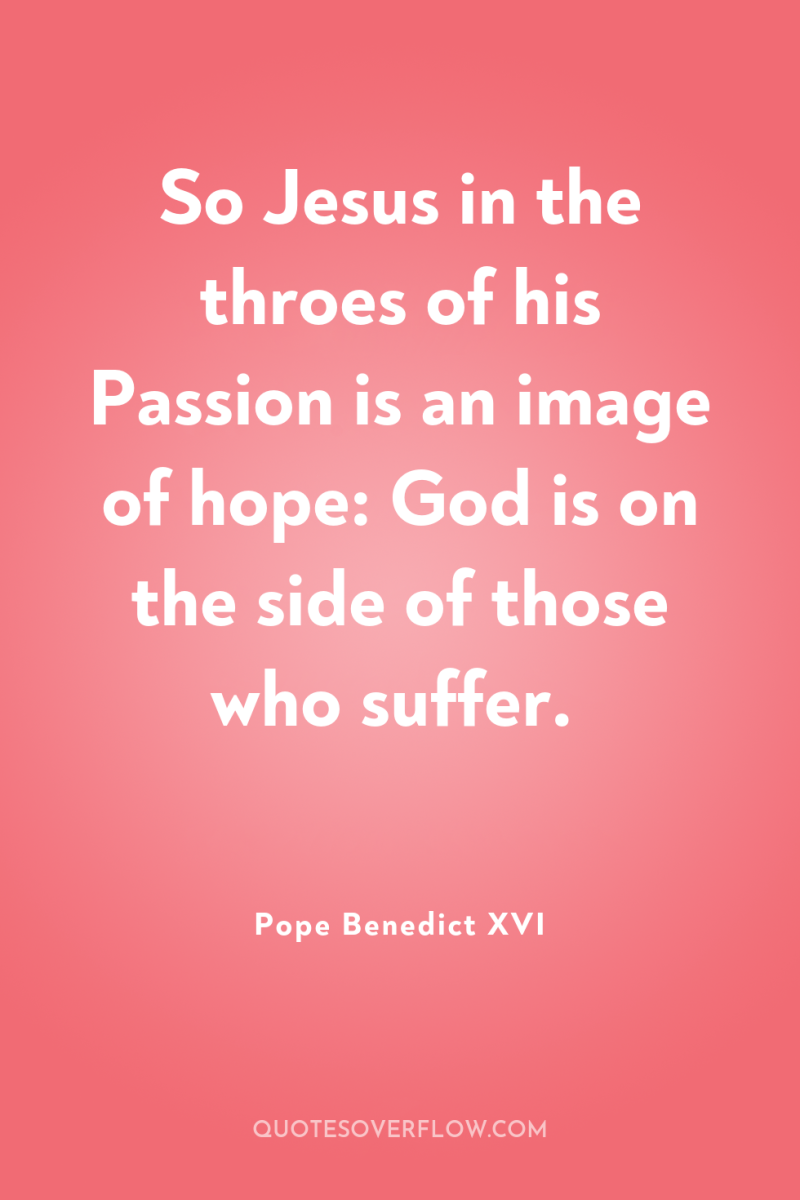
22
So Jesus in the throes of his Passion is an image of hope: God is on the side of those who suffer.Pope Benedict XVI
23
The State which would provide everything, absorbing everything into itself, would ultimately become a mere bureaucracy incapable of guaranteeing the very thing which the suffering person–every person–needs: namely, loving personal concern. We do not need a State which regulates and controls everything, but a State which, in accordance with the principle of subsidiarity, generously acknowledges and supports initiatives arising from the different social forces and combines spontaneity with closeness to those in need. The Church is one of those living forces.Pope Benedict XVI
24
It is theologically and anthropologically important for woman to be at the center of Christianity. Through Mary, and the other holy women, the feminine element stands at the heart of the Christian religion.Pope Benedict XVI
25
From a theological point of view, Easter is the center of the Church year; but Christmas is the most profoundly human feast of faith, because it allows us to feel most deeply the humanity of God. The crib has a unique power to show us what it means to say that God wished to be “Immanuel”–a “God with us”, a God whom we may address in intimate language, because he encounters us as a child.Pope Benedict XVI
26
The human spirit is so utterly one with the body that the term "form" can be used of the body and retain its proper meaning. Conversely, the form of the body is spirit, and this is what makes the human being a person.Pope Benedict XVI
27
Jesus assumes, as it were, the fall of man, lets himself into man's fallenness, prays to the Father out of the lowest depths of human dereliction and anguish. He lays his will in the will of the Father's: "Not my will but yours be done." He lays the human will in the divine. He takes up all the hesitation of the human will and endures it. It is this very conforming of the human will to the divine that is the heart of redemption. .Pope Benedict XVI
28
We throw ourselves down, as Jesus did, before the mystery of God's power present to us, knowing that the Cross is the true burning bush, the place of the flame of God's love, which burns but does not destroy.Pope Benedict XVI
29
Something I constantly notice is that unembarrassed joy has become rarer. Joy today is increasingly saddled with moral and ideological burdens, so to speak. When someone rejoices, he is afraid of offending against solidarity with the many people who suffer. I don't have any right to rejoice, people think, in a world where there is so much misery, so much injustice. I can understand that. There is a moral attitude at work here. But this attitude is nonetheless wrong. The loss of joy does not make the world better - and, conversely, refusing joy for the sake of suffering does not help those who suffer. The contrary is true. The world needs people who discover the good, who rejoice in it and thereby derive the impetus and courage to do good. Joy, then, does not break with solidarity. When it is the right kind of joy, when it is not egotistic, when it comes from the perception of the good, then it wants to communicate itself, and it gets passed on. In this connection, it always strikes me that in the poor neighborhoods of, say, South America, one sees many more laughing happy people than among us. Obviously, despite all their misery, they still have the perception of the good to which they cling and in which they can find encouragement and strength. In this sense we have a new need for that primordial trust which ultimately only faith can give. That the world is basically good, that God is there and is good. That it is good to live and to be a human being. This results, then, in the courage to rejoice, which in turn becomes commitment to making sure that other people, too, can rejoice and receive good news.Pope Benedict XVI
30
Each of you has a personal vocation which He has given you for your own joy and sanctity. When a person is conquered by the fire of His gaze, no sacrifice seems too great to follow Him and give Him the best of ourselves. This is what the saints have always done, spreading the light of the Lord ... and transforming the world into a welcoming home for everyone.Pope Benedict XVI
31
Are we not perhaps all afraid in some way? If we let Christ enter fully into our lives, if we open ourselves totally to him, are we not afraid that He might take something away from us? Are we not perhaps afraid to give up something significant, something unique, something that makes life so beautiful? Do we not then risk ending up diminished and deprived of our freedom? . No! If we let Christ into our lives, we lose nothing, nothing, absolutely nothing of what makes life free, beautiful and great. No! Only in this friendship are the doors of life opened wide. Only in this friendship is the great potential of human existence truly revealed. Only in this friendship do we experience beauty and liberation. And so, today, with great strength and great conviction, on the basis of long personal experience of life, I say to you, dear young people: Do not be afraid of Christ! He takes nothing away, and he gives you everything. When we give ourselves to him, we receive a hundredfold in return. Yes, open, open wide the doors to Christ — and you will find true life. Amen. .Pope Benedict XVI
32
To be sure, it was not Easter Sunday but Holy Saturday, but, the more I reflect on it, the more this seems to be fitting for the nature of our human life: we are still awaiting Easter; we are not yet standing in the full light but walking toward it full of trust.Pope Benedict XVI
33
How many winds of doctrine we have known in recent decades, how many ideological currents, how many ways of thinking. The small boat of thought of many Christians has often been tossed about by these waves - thrown from one extreme to the other: from Marxism to liberalism, even to libertinism; from collectivism to radical individualism; from atheism to a vague religious mysticism; from agnosticism to syncretism, and so forth. Every day new sects are created and what Saint Paul says about human trickery comes true, with cunning which tries to draw those into error (cf Ephesians 4, 14). Having a clear Faith, based on the Creed of the Church, is often labeled today as a fundamentalism. Whereas, relativism, which is letting oneself be tossed and 'swept along by every wind of teaching', looks like the only attitude acceptable to today's standards. We are moving towards a dictatorship of relativism which does not recognize anything as certain and which has as its highest goal one's own ego and one's own desires. However, we have a different goal: the Son of God, true man. He is the measure of true humanism. Being an 'Adult' means having a faith which does not follow the waves of today's fashions or the latest novelties. A faith which is deeply rooted in friendship with Christ is adult and mature. It is this friendship which opens us up to all that is good and gives us the knowledge to judge true from false, and deceit from truth.Pope Benedict XVI
34
In the end, even the “yes” to love is a source of suffering, because love always requires expropriations of my “I”, in which I allow myself to be pruned and wounded. Love simply cannot exist without this painful renunciation of myself, for otherwise it becomes pure selfishness and thereby ceases to be love.Pope Benedict XVI
35
The mature fruit of mystagogy is an awareness that one's life is being progressively transformed by the holy mysteries being celebrated. The aim of all Christian education, moreover, is to train the believer in an adult faith that can make him a "new creation", capable of bearing witness in his surroundings to the Christian hope that inspires him.Pope Benedict XVI
36
Evil draws its power from indecision and concern for what other people think.Pope Benedict XVI
37
The intellectual climate of the 1970s, for which the 1950s had already paved the way, contributed to this. A theory was even finally developed at that time that pedophilia should be viewed as something positive. Above all, however, the thesis was advocated-and this even infiltrated Catholic moral theology-that there was no such thing as something that is bad in itself. There were only things that were "relatively" bad. What was good or bad depended on the consequences. In such a context, where everything is relative and nothing intrinsically evil exists, but only relative good and relative evil, people who have an inclination to such behavior are left without no solid footing. Of course pedophilia is first rather a sickness of individuals, but the fact that it could become so active and so widespread was linked also to an intellectual climate through which the foundations of moral theology, good and evil, became open to question in the Church. Good and evil became interchangeable; they were no longer absolutely clear opposites.Pope Benedict XVI
38
Since man always remains free and since his freedom is always fragile, the kingdom of good will never be definitively established in this world. Anyone who promises the better world that is guaranteed to last forever is making a false promise; he is overlooking human freedom. Freedom must be constantly won over for the cause of good. Free assent to the good never exists simply by itself. If there were structures which could irrevocably guarantee a determined and good state of the world, man's freedom would be denied, and hence they would not be good structures at all.Pope Benedict XVI
39
Morality is not man's prison but rather the divine element in him.Pope Benedict XVI
40
The world offers you comfort. But you were not made for comfort. You were made for greatnessPope Benedict XVI
41
The love, loyalty, and dedication of Mary and Joseph are an example for all Christian couples, who are neither the friends nor masters of their children’s lives, but the guardians of this incomparable gift from God.Pope Benedict XVI
42
We are not some casual and meaningless product of evolution. Each of us is the result of a thought of God.Pope Benedict XVI
43
The theology of littleness is a basic category of Christianity. After all, the tenor of our faith is that God's distinctive greatness is revealed precisely in powerlessness. That in the long run, the strength of history is precisely in those who love, which is to say, in a strength that, properly speaking, cannot be measured according to categories of power. So in order to show who he is, God consciously revealed himself in the powerlessness of Nazareth and Golgotha. Thus, it is not the one who can destroy the most who is the most powerful..but, on the contrary, the least power of love is already greater than the greatest power of destruction.Pope Benedict XVI
44
The Twelve Apostles are the most evident sign of Jesus' will regarding the existence and mission of his Church, the guarantee that between Christ and the Church there is no opposition: despite the sins of the people who make up the Church, they are inseparable. Therefore, a slogan that was popular some years back, 'Jesus yes, Church no, ' is totally inconceivable with the intention of Christ. This individualistically chosen Jesus is an imaginary Jesus.Pope Benedict XVI
45
Thus [the altar] brings heaven into the community assembled on earth, or rather it takes the community beyond itself into the communion of saints of all times and places. We might put it this way: the altar is the place where heaven is opened up.Pope Benedict XVI
46
Only if the being of creation is good, only if trust in being is fundamentally justified, are humans at all redeemable. Only if the Redeemer is also Creator can he really be Redeemer. That is why the question of what we do is decided by the ground of what we are. We can win the future only if we do not lose creation.Pope Benedict XVI
47
Thus there is need of deeper reflection. Before entering into an examination of individual texts, we must direct our attention to the whole picture, the question of structure. Only in this way can a meaningful arrangement of individual elements be obtained. Is there any place at all for something like Mariology in Holy Scripture, in the overall pattern of its faith and prayer? Methodologically, one can approach this question in one of two ways, backwards or forwards, so to speak: either one can read back from the New Testament into the Old or, conversely, feel one’s way slowly from the Old Testament into the New. Ideally both ways should coincide, permeating one another, in order to produce the most exact image possible. If one begins by reading backwards or, more precisely, from the end to the beginning, it becomes obvious that the image of Mary in the New Testament is woven entirely of Old Testament threads. In this reading, two or even three major strands of tradition can be clearly distinguished which were used to express the mystery of Mary. First, the portrait of Mary includes the likeness of the great mothers of the Old Testament: Sarah and especially Hannah, the mother of Samuel. Second, into that portrait is woven the whole theology of daughter Zion, in which, above all, the prophets announced the mystery of election and covenant, the mystery of God’s love for Israel. A third strand can perhaps be identified in the Gospel of John: the figure of Eve, the “woman” par excellence, is borrowed to interpret Mary. .Pope Benedict XVI
48
Creation exists to be a place for the covenant that God wants to make with man. The goal of creation is the covenant, the love story of God and man.Pope Benedict XVI
49
God's dialogue with us becomes truly human, since God conducts his part as man.Pope Benedict XVI
50
The formula "the Church is the Body of Christ" thus states that the Eucharist, in which the Lord gives us his body, forever remains the place where the Church is generated, where the Lord himself never ceases to found her anew; in the Eucharist the Church is most compactly herself - in all places, yet one only, just as he is onePope Benedict XVI
51
After the evil spirit of a narrow Scholastic orthodoxy has been driven out, in the end seven much more wicked spirits return in its place.Pope Benedict XVI
52
The blessing hands of Christ are like a roof that protects us. But at the same time, they are a gesture of opening up, tearing the world open so that heaven my enter in, may become "present" within it.Pope Benedict XVI
53
The risen Lord is the new Temple, the real meeting place between God and man.Pope Benedict XVI
54
A tolerance that no longer distinguishes between good and evil would become chaotic and self-destructive, just as a freedom that did not respect the freedom of others or find the common measure of our respective liberties would become anarchy and destroy authority.Pope Benedict XVI
55
The fundamental human right, the presupposition of every other right, is the right to life itself. This is true of life from the moment of conception until its natural end. Abortion, consequently, cannot be a human right -- it is the very opposite. It is a deep wound in society.Pope Benedict XVI
56
Having a clear faith, based on the creed of the church is often labeled today as fundamentalism. Whereas relativism, which is letting oneself be tossed and swept along by every wind of teaching, look like the only attitude acceptable to today's standards.Pope Benedict XVI
57
The life of the community, both domestically and internationally, clearly demonstrates that respect for rights, and the guarantees that follow from them, are measures of the common good that serve to evaluate the relationship between justice and injustice, development and poverty, security and conflict.Pope Benedict XVI
58
The principle of tolerance and respect for freedom promoted by the reforms of the Second Vatican Council are today being manipulated and erroneously taken too far.Pope Benedict XVI
59
We must respect the interior laws of creation, of this Earth, to learn these laws and obey them if we want to survive.Pope Benedict XVI
60
Not all moral issues have the same moral weight as abortion and euthanasia. There may be legitimate diversity of opinion even among Catholics about waging war and applying the death penalty, but not... with regard to abortion and euthanasia.Pope Benedict XVI
61
In reality, I am more a professor, one who reflects and mediates on spiritual questions. Practical governance is not my strong point, and this is certainly a weakness. But I do not see myself as a failure. For eight years, I carried out my work.Pope Benedict XVI
62
A just laicism allows religious freedom. The state does not impose religion but rather gives space to religions with a responsibility toward civil society, and therefore it allows these religions to be factors in building up society.Pope Benedict XVI
63
The Christian faith can never be separated from the soil of sacred events, from the choice made by God, who wanted to speak to us, to become man, to die and rise again, in a particular place and at a particular time.Pope Benedict XVI
64
There are those who argue that the public celebration of festivals such as Christmas should be discouraged, in the questionable belief that it might somehow offend those of other religions or none.Pope Benedict XVI
65
Artificial intelligence, in fact, is obviously an intelligence transmitted by conscious subjects, an intelligence placed in equipment. It has a clear origin, in fact, in the intelligence of the human creators of such equipment.Pope Benedict XVI
66
An important function of theology is to keep religion tied to reason and reason to religion. Both roles are of essential importance for humanity.Pope Benedict XVI
67
There are those who would advocate that the voice of religion be silenced, or at least relegated to the purely private sphere.Pope Benedict XVI
68
God of peace, bring your peace to our violent world: peace in the hearts of all men and women and peace among the nations of the Earth.Pope Benedict XVI
69
The wrath of God is a way of saying that I have been living in a way that is contrary to the love that is God. Anyone who begins to live and grow away from God, who lives away from what is good, is turning his life toward wrath.Pope Benedict XVI
70
God does not change; he is Love, ever and always. In himself, he is communion, unity in Trinity, and all his words and works are directed to communion.Pope Benedict XVI
71
I would designate as science fiction in the best sense: they are visions and anticipations by which we seek to attain a true knowledge, but, in fact, they are only imaginations whereby we seek to draw near to the reality.Pope Benedict XVI
72
Loving the church also means having the courage to make difficult, trying choices, having ever before oneself the good of the church and not one's own.Pope Benedict XVI
73
The positive aspects of modernity are to be acknowledged unreservedly: we are all grateful for the marvellous possibilities that it has opened up for mankind and for the progress in humanity that has been granted to us.Pope Benedict XVI
74
I don't know if the term 'liberation theology, ' which can be interpreted in a very positive sense, will help us much. What's important is the common rationality to which the church offers a fundamental contribution, and which must always help in the education of conscience, both for public and for private life.Pope Benedict XVI
75
The Gospel purifies and renews: it bears fruit wherever the community of believers hears and welcomes the grace of God in truth and lives in charity. This is my faith this is my joy.Pope Benedict XVI
76
If we may not remain silent about evil in the Church, then neither should we keep silent about the great shining path of goodness and purity which the Christian faith has traced out over the course of the centuries.Pope Benedict XVI
77
For me, it's a great joy to be together with priests: in the end, the bishop of Rome is the bishop and brother of all priests. His mandate is to confirm the brothers in the faith.Pope Benedict XVI
78
God guides his church, maintains her always, and especially in difficult times. Let us never lose this vision of faith, which is the only true vision of the way of the church and the world.Pope Benedict XVI
79
On the one hand, faith is a profoundly personal contact with God, which touches me in my innermost being and places me in front of the living God in absolute immediacy in such a way that I can speak with Him, love Him, and enter into communion with Him.Pope Benedict XVI
80
Both need each other: The agnostic cannot be content to not know, but must be in search of the great truth of faith; the Catholic cannot be content to have faith, but must be in search of God all the time, and in the dialogue with others, a Catholic can learn more about God in a deeper fashion.Pope Benedict XVI
81
We must have great respect for these people who also suffer and who want to find their own way of correct living. On the other hand, to create a legal form of a kind of homosexual marriage, in reality, does not help these people.Pope Benedict XVI
82
Above all, we must have great respect for these people who also suffer and who want to find their own way of correct living. On the other hand, to create a legal form of a kind of homosexual marriage, in reality, does not help these people.Pope Benedict XVI
83
It is essential that God created men and women to be one, as it is said in the first chapters of the Bible. So I think even if our culture is against marriage as essential form of relations between human beings, between women and men. I think our nature is always present, and we can understand it if we will understand it.Pope Benedict XVI
84
I realized that everything I had to do I could not do on my own, and so I was almost obliged to put myself in God's hands, to trust in Jesus who - while I wrote my book on him - I felt bound to by an old and more profound friendship.Pope Benedict XVI
85
It is very important for a priest, in the parish itself, to see how people trust in him and to experience, in addition to their trust, also their generosity in pardoning his weaknesses.Pope Benedict XVI
86
We need Grace and forgiveness.Pope Benedict XVI
87
All the great works of art, the cathedrals - the Gothic cathedrals and the splendid Baroque churches - are a luminous sign of God, and thus are truly a manifestation, an epiphany of God.Pope Benedict XVI
88
Today, I, too, wish to reaffirm that I intend to continue on the path toward improved relations and friendship with the Jewish people, following the decisive lead given by John Paul II.Pope Benedict XVI
89
How much we need, in the church and in society, witnesses of the beauty of holiness, witnesses of the splendour of truth, witnesses of the joy and freedom born of a living relationship with Christ!Pope Benedict XVI
90
Human rights, of course, must include the right to religious freedom, understood as the expression of a dimension that is at once individual and communitarian - a vision that brings out the unity of the person while clearly distinguishing between the dimension of the citizen and that of the believer.Pope Benedict XVI